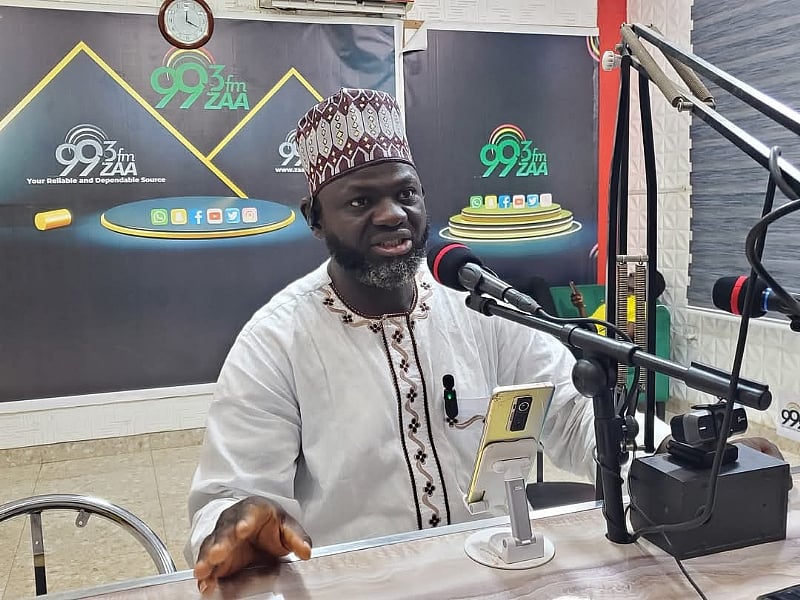The announcement of a reduced Hajj fare for 2025 has sparked a wave of gratitude within Ghana’s Muslim community, with prominent figures like Doctuur Abu Dujana Basha, leader of the Darul Tawheed Institute, publicly expressing his appreciation to President John Dramani Mahama. Basha’s commendation, delivered during a radio interview, highlighted the significant financial relief this reduction provides for prospective pilgrims, easing the burden on the Muslim ummah. He emphasized the importance of acknowledging this presidential gesture and urged Muslim leaders across the nation to offer prayers of thanks for President Mahama during Friday congregational prayers. This call for collective gratitude underscores the impact of the reduced fare on the accessibility of the Hajj pilgrimage for Ghanaian Muslims.
Basha’s appeal for prayerful appreciation reinforces the significance of the Hajj within the Muslim faith and acknowledges the president’s role in facilitating this important religious journey. He further encouraged utilizing Friday sermons, the central platform of community gathering and spiritual guidance, to express gratitude to the president for his responsiveness to the needs of the Muslim community. By highlighting the fulfillment of two major campaign promises related to Hajj, Basha positioned the fare reduction as a testament to the president’s commitment to the Muslim population and his attentiveness to their concerns. This public expression of gratitude serves to strengthen the relationship between the government and the Muslim community, demonstrating the positive impact of policy decisions that address the specific needs of religious groups.
The announcement of the reduced fare, disseminated via social media by Deputy Presidential Spokesperson Shamima Muslim, confirmed the decrease to GH₵62,000 (approximately $4,130) for the 2025 Hajj. This represents a substantial decrease from the previous years’ fares of GH₵75,000, providing significant financial relief to prospective pilgrims. Alongside the fare reduction, Muslim announced an increase in Ghana’s Hajj quota to 5,000 pilgrims, a 1,000-person increase from the previous year. This expansion of the quota further underscores the government’s commitment to facilitating greater access to the Hajj for Ghanaian Muslims, allowing more individuals to fulfill this pivotal religious obligation.
The fare reduction fulfills a key campaign promise made by President Mahama, demonstrating a tangible commitment to addressing the financial concerns of the Muslim community regarding Hajj participation. By delivering on this promise, the president has solidified his connection with this segment of the population, reinforcing his image as a leader attentive to the needs of diverse religious groups. The reduction also brings Ghana’s Hajj fare closer in line with those of neighboring countries like Côte d’Ivoire, where pilgrims paid roughly $5,500 for both the 2024 and 2025 Hajj. This regional comparison highlights the competitiveness of Ghana’s revised fare and further emphasizes the positive impact of the president’s decision.
The historical context of Hajj fares in Ghana reveals a fluctuating landscape, with the 2023 and 2024 fares reaching approximately GH₵75,000 (around $6,500). This consistent high cost posed a significant challenge for many aspiring pilgrims, highlighting the economic strain associated with fulfilling this religious duty. The substantial reduction for 2025 therefore represents a significant departure from this trend, signaling a renewed focus on affordability and accessibility. The reduction not only alleviates the financial burden on individuals but also potentially broadens participation, allowing more Ghanaian Muslims to experience the Hajj pilgrimage.
In summary, the reduction in the 2025 Hajj fare, coupled with the increased pilgrim quota, signifies a positive development for Ghana’s Muslim community. This decision, lauded by religious leaders and community members alike, fulfills a key presidential promise and reflects a commitment to supporting religious practices. The reduction aligns Ghana’s Hajj costs more closely with those of neighboring countries, highlighting the government’s efforts to ensure affordability and accessibility for its Muslim citizens. This move is expected to significantly impact the ability of Ghanaian Muslims to participate in the Hajj, fulfilling a deeply significant religious obligation.














